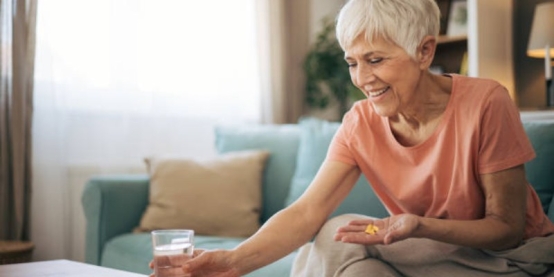Best Vitamins and Supplements for Seniors
Ageing brings wisdom, but it also brings health challenges. Many seniors struggle with weak bones, poor memory, low energy, and slow healing. Some nutrients may not be obtained solely from food, as the body's needs change with age. This is why good vitamins and supplements matter for seniors. Taking the right ones can help maintain strength, support the immune system, and keep the mind sharp. But it must be done right.
Many people buy vitamins without thinking. That is not wise. Seniors need to know what works for their age and health conditions. This guide breaks down the best options and what they help with, so nobody wastes money or risks taking the wrong thing.
Strong Bones and Joints Matter
Older adults often face weak bones and joint pain. Calcium and vitamin D are top choices for this. Calcium helps keep bones strong and prevents breaks. Vitamin D helps the body absorb calcium. Many seniors do not receive enough sunlight, resulting in lower vitamin D levels. Weak bones and falls are dangerous, so these two nutrients are essential.

According to Harvard Health, seniors should consult a doctor before taking high doses of vitamin D or calcium. Too much can lead to kidney stones or other problems. The correct dose depends on various factors, including diet, lifestyle, and other underlying health conditions.
Some also add magnesium. Magnesium works in conjunction with calcium to maintain strong bones. It also helps with muscle function.
For joints, glucosamine and chondroitin are popular. They help with joint pain and may slow down wear and tear in older knees and hips. These can be derived from shellfish or synthesised in a lab. While they do not cure arthritis, many seniors report feeling less stiff with them.
A Healthy Heart Needs Attention
Heart problems increase with age. Omega-3 fatty acids are suitable for the heart. They primarily come from fish such as mackerel. If fish is not often on the menu, seniors can consider taking fish oil pills or algae oil as a plant-based alternative. Omega-3s help lower bad fats in the blood and may protect the heart.
Coenzyme Q10, known as CoQ10, is another helper. The body makes CoQ10 naturally, but levels drop with age. It helps cells produce energy and supports heart health. Some people taking cholesterol-lowering drugs take CoQ10 because these medications can lower CoQ10 levels.
The American Heart Association recommends obtaining omega-3s from food first, but supplements can be helpful if needed. Seniors should ask a doctor before adding fish oil or CoQ10 to avoid mixing with other drugs.
Keep the Brain Sharp
Many seniors worry about memory and focus. Some vitamins may help the brain. B vitamins, such as B6, B12, and folate, play a crucial role in maintaining the health of nerves and brain cells. Low B12 levels are common in older adults because the stomach may not absorb it as efficiently as it once did. Signs of low B12 include tiredness, confusion, or numbness.
Some people take ginkgo biloba for memory improvement, but its effectiveness is still debated. It helps with blood flow to the brain.

Vitamin E is another choice for brain health. However, high doses can cause problems, so seniors must exercise caution. The National Institutes of Health notes that excessive vitamin E intake can increase the risk of bleeding. Always stick to safe doses.
Strong Immunity and Energy
Ageing affects the immune system. Seniors often catch colds or infections more easily. Vitamin C and zinc are classic choices for boosting the immune system. They help the body fight germs and heal wounds faster.
Iron may help alleviate tiredness in individuals with low iron levels. However, too much iron can be harmful, so it is essential to check blood levels before adding iron.
Another helper is probiotics. These are good bacteria that live in the gut. They help with digestion and may also boost immunity. Yoghurt and fermented foods contain probiotics, but supplements are also available.
Are Multivitamins Good for Seniors?
Many older adults opt for a multivitamin instead of taking individual vitamins. This can help fill nutritional gaps. But not all multivitamins are the same. Some individuals have more than what their bodies need. Extra vitamins that the body cannot use may be excreted through urine or cause harm if taken in excessive amounts.
Multivitamins are not a magic solution. Food should always come first. A balanced diet consisting of fruits, vegetables, whole grains, lean protein, and healthy fats is ideal. Supplements are designed to help when food alone does not meet our needs.
What to Watch Out For
Not all supplements are safe for everyone. Some vitamins and herbs may clash with prescription drugs. Seniors often take more than one medication, so it is wise to check with a doctor or pharmacist before adding new pills.
Quality matters too. Some inexpensive brands do not meet the claims on their labels. Others may contain harmful fillers. Look for brands that follow good manufacturing practices.
Seniors should also be aware that taking more does not necessarily mean better. High doses of vitamins can cause harm over time. Stick to trusted doses and check labels.

Small Steps Make Big Differences
Supplements work best with a healthy lifestyle. Small daily habits, such as walking, stretching, or performing simple home exercises, help keep muscles and bones strong. Drinking enough water and eating balanced meals keep the body working well.
Sleep matters too. Seniors should get enough rest to help their bodies repair and stay alert. Stress can also impact health, so staying connected with family and friends is beneficial for both the mind and body.
Good health in older age does not mean spending on every supplement out there. It means knowing what is needed and making informed choices.
Talk to Professionals
Before starting any new vitamin or supplement, consult a doctor or dietitian. They can run tests, check blood levels, and suggest the best options. It saves money and keeps the body safe.
Ageing is a gift, but it takes effort to stay healthy and active. The right vitamins and supplements, taken wisely, help make the golden years feel stronger, brighter, and longer.